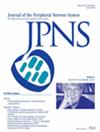Evidence for spontaneous regulation of the humoral IgM anti-GM1 autoimmune response by IgG antibodies in multifocal motor neuropathy patients
Abstract
Background and Aims
Multifocal motor neuropathy (MMN) is a peripheral nerve disorder characterized by slow progressive distal asymmetric weakness with minimal or no sensory impairment. Currently, a vast evidence supports a direct pathogenic role of IgM anti-GM1 antibodies on disease pathogenesis. Patients with MMN seropositive for GM1-specific IgM antibodies have significantly more weakness, disability and axon loss than patients without these antibodies. During the screening for IgM anti-GM1 antibodies in a cohort of patients with neuropathy we noticed an absence or significant reduction of natural IgM anti-GM1 autoreactivity in some patients with MMN, suggesting a mechanism of self-control of autoreactivity. We aim to understand the lack of natural reactivity against GM1 in MMN patients.
Methods
The presence of free IgM anti-GM1 reactivity or its complex to blocking IgG was analysed by combining high performance thin layer chromatography-immunostaining, soluble binding inhibition assays, Protein-G or GM1-affinity columns and dot blot assays.
Results
We identified in MMN patients an immunoregulation of IgM anti-GM1 antibodies mediated by IgG immunoglobulins characterized by: (i) lack of natural IgM anti-GM1 autoreactivity as a result of a immunoregulatory IgG-dependent mechanism; (ii) presence of natural and disease-associated IgM anti-GM1/IgG blocking Ab complexes in sera; and (iii) high levels of IgG blocking against natural IgM anti-GM1 antibodies (Abs.
Interpretation
Our observations unmask a spontaneous IgG-dependent mechanism of immunoregulation against IgM anti-GM1 antibodies that could explain, in part, fluctuations in the usually slowly progressive clinical course that characterizes the disease and, at the same time, allows the identification of an autoimmune response against GM1 ganglioside in seronegative patients.

 求助内容:
求助内容: 应助结果提醒方式:
应助结果提醒方式:


